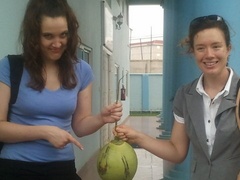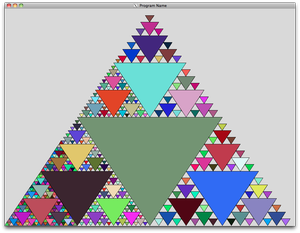AITI technical lectures are so much fun: this is my first time learning about web frameworks, and it's immediately apparent how powerful these concepts are. I wish Django had existed when I was in high school!
The students have gone from building Heroku-powered blogs to creating commeting systems with HTML forums. Databases are so cool! They're even dabbling in Bootstrap to do the dirty work of CSS for them. Some have a really good sense of color. Some are creating sites that are magenta, cyan, and lime green. Ah well! Everyone has a functional blog.
Their business pitch compeition is on Wednesday of next week. Final ideas have been finalized. (Tautological cat is tautological.) Slide decks are being created. (Does the term "deck" originate from HyperCard?)
Two very interesting companies sent guest speakers to our classroom this week: Techno, a Chinese mobile handset maker, and Tigo, a mobile telecom operator. Techno pretty much just gave a marketing pitch for their phones (some have slots for up to FOUR SIM CARDS, how wild is that?!), but the students asked really good questions: "In Ghana, Chinese products are generally perceived as fake or cheap. How did you overcome that attitude?" A colleague of a former roommate of mine, now at Tigo, completely hit the ball out of the park with a talk on how engineers can become effective managers. He stressed the importance of "know[ing] thyself" and communication. Selorm was highly engaging and got students up to practice various communication scenarios with him.
We've been meeting with some great folks involved in the mobile entrepreneurship community in Accra. If they're not able to help us, they're more than happy to provide other contacts. I wish we were here for more than seven weeks to follow up with all the names and companies! I think our best bets for forming partnerships to support our students' ideas and potential companies are with Mobile Friday (MFriday) and Mobile Monday (which meets on FRIDAYS at the Advanced Information Technology Institute Kofi Annan Centre for Excellence, AITI-KACE... no that's not at all confusing), two organizations that encourage students to develop mobile apps. Even if MIT instructors aren't here year-round, hopefully these groups can help foster the community and continued desire necessary for our participants to keep working on their startups.
I'm home sick with something that is graciously not malaria. The students knew something was up this week when the usually "energetic" Sondy seemed to lack the ability to stay awake for the entire day. I'd like to credit the health care system here or even modern medicine for helping me get better, but resting, not eating anything, and drinking water seem to be the cure for I Can't Believe It's Not Malaria™. If you're wondering why this post is shorter and less detailed than usual, there you have it. Just like fufu and coconuts, tropical maladies seem to be part of the experience and adventure here. Always something new and exciting, though honestly I'd prefer new foods to this...


